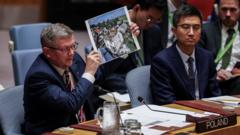Why Are More NATO Countries Sending Troops and Aircraft to Poland?

Published: 2025-09-13 04:54:11 | Category: world
This article outlines the significant military responses from NATO countries following a recent Russian drone incursion into Polish airspace. In a show of solidarity, nations such as Denmark, France, and Germany are deploying troops and fighter jets eastwards to bolster the alliance's eastern flank, while tensions in Europe escalate against the backdrop of halted peace talks between Russia and Ukraine.
Last updated: 10 October 2023 (BST)
Key Takeaways
- NATO countries are moving troops and fighter jets eastward in response to a Russian drone incursion into Poland.
- Denmark, France, and Germany are among the nations contributing military support.
- Russia's military claims no intent to target Poland, but leaders suspect the incursion was deliberate.
- The United States and European countries expressed unwavering support for Poland during a UN Security Council session.
- Peace talks between Russia and Ukraine are reportedly on "pause".
The Context of the Incursion
On Wednesday, Poland reported that 19 Russian drones had violated its airspace. This incident marked a significant escalation in the ongoing tensions between NATO and Russia, raising alarms about the security of Eastern Europe. Some drones were intercepted, while others crashed into civilian areas—including a house—highlighting the potential risks of such military provocations.
Poland's response indicates a robust stance against perceived threats, as its Secretary of State Marcin Bosacki emphasised that the incident was not accidental. The political climate in Europe has been charged, with many leaders expressing concerns over Russia's intentions in the region. In addition to the military responses, the diplomatic rhetoric surrounding the situation has also intensified.
Responses from NATO Allies
In light of the recent airspace violations, several NATO allies have pledged military support to Poland. Denmark, for instance, will be contributing two F-16 fighter jets along with a warship to enhance Poland's air defence capabilities. Denmark's Prime Minister Mette Frederiksen stated, "We must not be naive. Putin will stop at nothing, and he is testing us." This sentiment reflects a growing consensus among NATO nations to take a firmer stand against Russian aggression.
France and Germany have also announced their contributions. France will send three Rafale fighter jets, while Germany will deploy four Eurofighters to the region. The UK's Ministry of Defence has confirmed its commitment to strengthening the Eastern Sentry, although further details on their military involvement are forthcoming.
The Role of the United States
The United States has reiterated its support for its NATO allies during an urgent UN Security Council meeting. Acting US Ambassador to the UN, Dorothy Shea, stated, "The United States stands by our NATO allies in the face of these alarming airspace violations." This assurance is crucial, especially given the historical context of US involvement in European security matters.
What Happens Next?
As the situation develops, it is clear that NATO's eastern flank will see an increase in military assets, which may include further deployments from other member states. Countries such as the Netherlands and the Czech Republic have already committed to sending defensive equipment to Poland. Meanwhile, Lithuania is set to receive a German brigade to enhance its own defence capabilities.
Germany's commitment to intensify its engagement along NATO's eastern border signals a shift in strategy, especially regarding air policing over Poland. This proactive approach aims to deter further incursions and reassure Eastern European nations of NATO's protective umbrella.
Political Implications and Future Prospects
The ongoing tensions and military build-up along NATO's eastern flank have broader implications for Europe. The Kremlin's statement indicating that peace talks with Ukraine are on "pause" raises questions about the future of diplomatic resolutions in the region. As the conflict continues, the potential for military confrontations remains high, especially if further provocations occur.
Poland's assertive response to the drone incident is likely to influence other Eastern European nations to bolster their defences. The collective military response from NATO could deter future violations and signal a united front against Russian aggression.
Public Sentiment and Regional Stability
Public sentiment in Eastern Europe is likely to be affected by these developments. Citizens may feel a mix of apprehension and reassurance knowing that their governments are taking steps to bolster security. The effectiveness of NATO's collective defence strategy will be put to the test as the situation unfolds, and it is crucial for member states to maintain unity to ensure regional stability.
Conclusion
The recent Russian drone incursion into Polish airspace has sparked a significant military response from NATO countries, reflecting the alliance's commitment to defending its eastern flank. As tensions rise, the unity and preparedness of NATO members will play a pivotal role in deterring future threats and ensuring the safety of Eastern Europe. The ongoing developments highlight the fragile nature of peace in the region and the importance of diplomatic efforts alongside military readiness.
As NATO reinforces its eastern positions, the question remains: how will Russia respond to these escalated military deployments? The coming weeks may provide critical insights into the evolving dynamics of security in Europe. #NATO #RussianIncursion #Poland
FAQs
What was the nature of the Russian drone incursion into Poland?
The Russian drone incursion involved 19 drones that violated Polish airspace, some of which were shot down, while others crashed into fields and a residential area.
What military support is Poland receiving from NATO allies?
NATO allies including Denmark, France, and Germany are sending fighter jets and warships to support Poland's air defence in response to the drone incursion.
What did the Kremlin say about the drone incursion?
The Kremlin stated it had "no plans to target facilities" in Poland, but Polish and European leaders suspect the incursion was a deliberate act.
How have the US and other NATO members reacted?
The US, along with other NATO members, expressed strong support for Poland during a UN Security Council meeting, reaffirming their commitment to defend NATO territory.
What is the current status of peace talks between Russia and Ukraine?
Peace talks between Russia and Ukraine are reportedly on "pause," according to Kremlin spokesman Dmitry Peskov, reflecting the ongoing tensions and military escalations.



